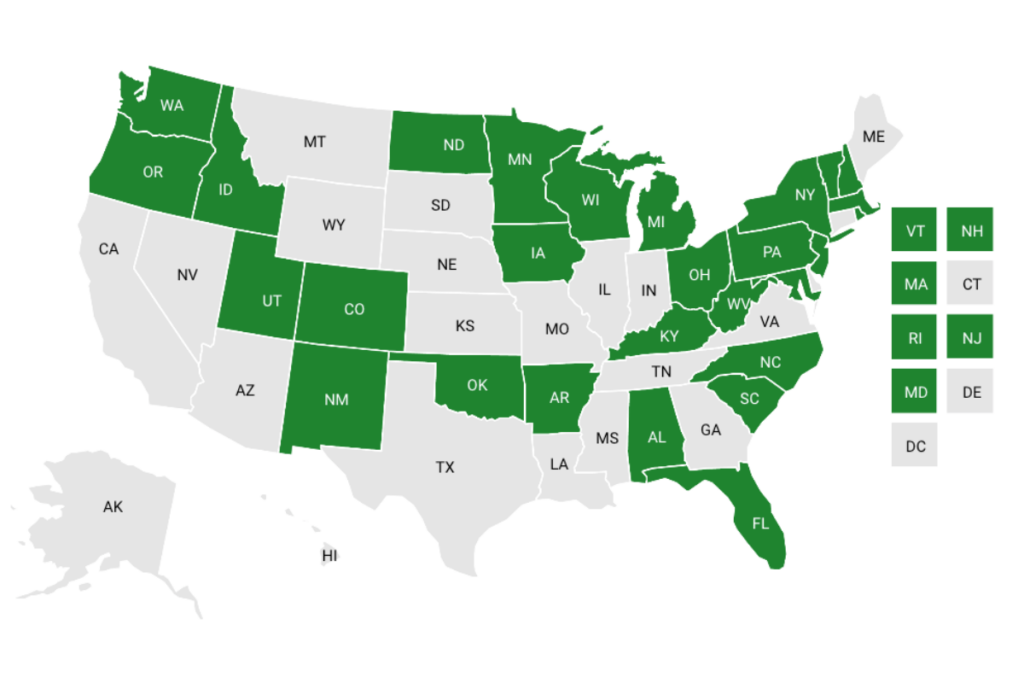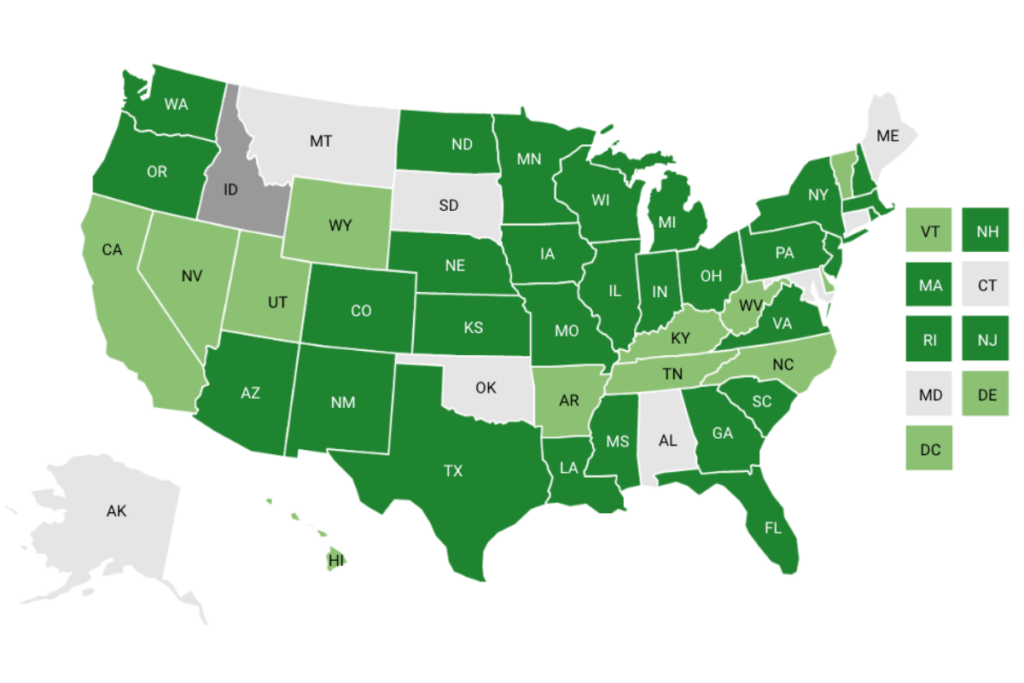This information was collected through a combination of state surveys and NASHP staff research. It offers a snapshot of how the state is defining, training, certifying, and paying for the CHW workforce — as well as how the state is developing cross-agency and state-to-local strategies to improve community health in partnership with CHWs.
This is a dynamic policy space, and states are continuing to develop new approaches. We will continue to make periodic updates to this page. Learn more about state CHW policies across the U.S.
State CHW Definition
Arizona uses the APHA definition of CHWs, with the following addition: “[CHWs] are essential components to the current and future infrastructure of healthcare. CHW is an umbrella term used to encompass many different job descriptions including Community Health Representatives, Patient Navigator, Promotores de Salud, Community Health Advisors and Cultural Health Navigators, to name a few.”
Certification and Training
The Arizona Department of Health Services (ADHS) finalized the rules for voluntary certification and launched the online application in November 2022. The final rules outline the scope of work and core competencies of CHWs in Arizona, including minimum education, training, and experience requirements.
Arizona Community Health Workers Association (AzCHOW), ADHS, and University of Arizona Prevention Research Center (AzPRC) partner to implement the CHW Training Program Approval process. This process ensures that CHW training is based in the core competencies and equips CHWs with the skills and knowledge needed. Organizations looking to offer training for CHWs that meet the requirements for certification submit a training plan that is reviewed by a committee featuring CHWs and key partners.
Medicaid Reimbursement
Arizona’s state Medicaid program, the Arizona Health Care Cost Containment System (AHCCCS), reimburses for CHW services under its State Plan. AHCCCS’s State Plan Amendment was approved in February 2023, with an effective date of April 1, 2023. Medicaid covered CHW/Community Health Representative (CHR) services include patient education and preventive services to individuals with chronic conditions, who are at risk-of chronic conditions, or who otherwise have a documented health barrier. To be reimbursed for CHW services under Medicaid, CHWs/CHRs must be registered as AHCCCS providers. CHW services may be billed with CPT codes 98960, 98961, or 98962.
Other Funding or Financing Mechanisms
The Arizona Advisory Council on Indian Health Care Community Health Workers for COVID Response and Resilient Communities receives funding from the CDC Community Health Workers for COVID Response and Resilient Communities (CCR) initiative. A partnership between AHCCCS and the Arizona Advisory Council on Indian Health Care, the program seeks to build the CHR workforce.
Indian Health Services funds CHRs employed by Tribes in the state. CHRs that work for Tribes consist of 30 percent of the state’s CHW workforce.
Key Partnerships
- The AzCHOW supports the workforce through advocacy, CHW and supervisor training, technical assistance, and engagement.
- AzPRC is working with the Arizona Department of Health Services (ADHS), AzCHOW, and other partners to monitor the impact of certification and other efforts to support the workforce.
- The Northern Arizona University (NAU) Center for Health Equity Research is working with AzCHOW, the Arizona CHW Workforce Coalition, the Tribal Community Health Representative Movement/Directors Workgroup, and other partners to support the advancement and sustainability of CHW/CHRs across the state through research, advocacy, and policy.
- Other partners include Promotores HOPE Network, Rural Arizona CHW Workforce Development Network, Health Disparities CHW Community of Practice, Pima County CHW Coalition/Community of Practice, Yuma County CHW Coalition, and Cochise County CHW Coalition, among others.
State CHW Legislation
HB2324, signed into law in May 2018, established a voluntary certification for CHWs, including convening of a CHW Advisory Council responsible for making recommendations to ADHS on the certification requirements and process.
State Resources
- Arizona Department of Health Services — Community Health Workers
- Arizona Department of Health Services CHW Special Licensing
- Arizona Health Care Cost Containment System — Community Health Workers and Community Health Representatives
- Arizona Community Health Workers Association
- Arizona Advisory Council on Indian Health Care — Community Health Representatives
State Overviews
ACO – Accountable care organization
AHEC – Area Health Education Centers
APHA – American Public Health Association
APM – Alternative payment model
CBO – Community-based organization
CDC – Centers for Disease Control and Prevention
CDC CCR Funding – Community Health Workers for COVID Response and Resilient Communities Funding
CHR – Community health representative
CHW – Community health worker
CPT Codes – Current Procedural Terminology Codes
C3 Project – CHW Core Competency Project
FFS – Fee for services
HCSPCS Codes – Healthcare Common Procedure Coding System Codes
HRSA – Health Resources & Services Administration
MCO – Managed care organization
NACHW – National Association of Community Health Workers
SDOH – Social determinants of health
VBP – Value-based payment
State CHW Definition: This category indicates where states have a formal definition of a CHW. In some cases, where there is not a definition in statute, this category may draw information from provider manuals and state websites or reports.
Certification and Training: This category includes information about how CHWs are trained in the state, which entities provide training, whether or not the state runs or recognizes a CHW certification program, and information about the entities that administer existing certification programs.
Medicaid Reimbursement: This category includes information about state Medicaid strategies that provide enrollees access to CHW services. Entries indicate whether state Medicaid programs currently reimburse for CHW services or incorporate CHWs into alternative payment models under the authority of a state plan amendment (SPA), or where states have earmarked funds to support CHW services under the authority of an 1115 demonstration waiver. It also indicates where CHW services might be supported through managed care approaches (e.g., where MCOs are paying for CHW services using administrative dollars or where states are using managed care contracts to incentivize or require MCOs to cover CHW services).
Other Funding or Financing Mechanisms: This category includes information about other state funding or financing approaches that cover CHW services or CHW positions. It includes information about federal grant dollars for which the state is the grantee.
Key Partnerships: This category offers information about key partners outside state government, including state CHW associations and CHW training entities, and highlights formal cross-agency partnerships within the state that support alignment of funding and resources for the CHW workforce.
State CHW Legislation: This category highlights any state legislation relevant to the CHW workforce. This might include statutory language directing agencies to develop a Medicaid reimbursement approach, laws that established state CHW certification, or other relevant statutes.
State Resources: This category offers links to any key reports or resources that states elected to highlight as critical to CHW policy and partnership.



